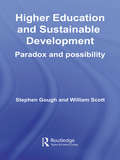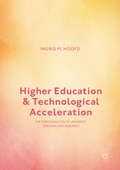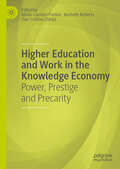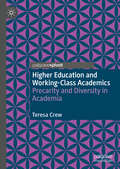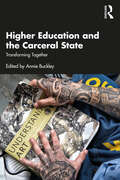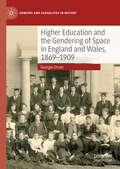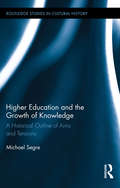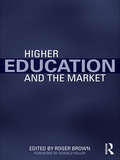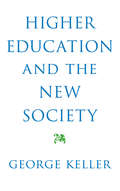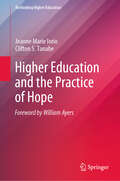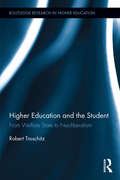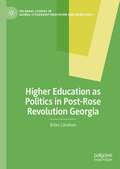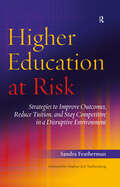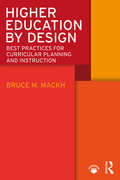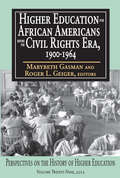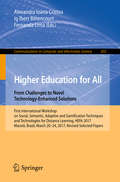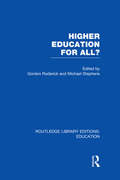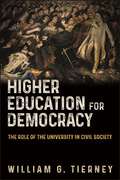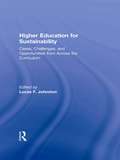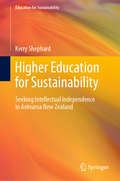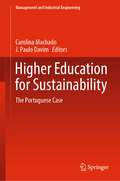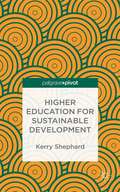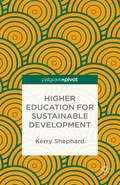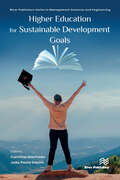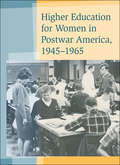- Table View
- List View
Higher Education and Sustainable Development: Paradox and Possibility (Key Issues in Higher Education)
by William Scott Stephen GoughThe ‘Key Issues in Higher Education’ series aims to raise both awareness and the standards of debate on the fundamental issues that lie at the very heart of higher education and intends to assist national and international debate. Higher Education and Sustainable Development examines whether it is actually possible to mandate, plan, monitor and evaluate the higher education sector’s route to the production of educated, innovative, independent, self-determining, critical individuals while at the same time achieving a range of wider policy goals on the side. This book examines this question in the context of a particular international policy issue – sustainable development – which is now seen across the globe as a necessary and urgent response to a range of social and environmental issues that threaten the integrity of the biosphere and human well being. The book concludes that the idea of sustainable development holds both opportunities and dangers for universities as they pursue their proper role in a free society. Illustrated by seven in-depth case studies this book considers the complex inter-relationships of a free society and sustainable development in the context of higher education, and aims to makes recommendations for realistic future development. It is essential reading for the international higher education research community, policy-makers, university managers, students and non-Governmental organizations in the development, environment and social policy sectors.
Higher Education and Technological Acceleration: The Disintegration of University Teaching and Research
by Ingrid M. HoofdThis book critically examines the relationship between new media technologies, research ethics, and pedagogical strategies within the contemporary university. It debates whether recent transformations of higher education, rather than an effect of neo-liberalization, are actually an outflow of the technological acceleration of the university's own contradictory ideals around knowledge and democracy. The book sets up this argument by likening the university to a "vision machine" which quest for total scientific and social transparency has recently caved in on itself, negatively affecting staff and student well-being. The book asserts that this situation reveals the essential tension at the heart of the university system, and explores the acceleration of this tension by analyzing a variety of teaching and research advances from Europe and Asia. Examining among other issues the call for creativity and critical thinking in the curriculum, the push for e-learning, and the advent of the digital humanities, this text offers a key analysis of the university's founding ideals and its constitutive relationship to technological acceleration.
Higher Education and Work in the Knowledge Economy: Power, Prestige and Precarity
by Kenneth Roberts Maria-Carmen Pantea Dan-Cristian DabijaIn recent years, the ‘knowledge economy’ has re-entered political discourse as a future-oriented, seductive and optimistic concept. It heralds knowledge and intellectual capability as unlimited and mobile resources of production that can be used for the prosperity of all. Knowledge economy has been linked with the promise of fairness, free from the traditional factors of production, with education as the only prerequisite. This interdisciplinary volume examines the career paths of university graduates, the role of higher education and the internal hierarchies shaping employment in the knowledge economy. The promise of fairness and social inclusivity has not yet played out. Despite increasing numbers of degree holders, the advancements of AI and other technologies is now expected to bring a ‘knowledge substitution’ rather than a human-centred knowledge economy. This book raises questions about the kind of jobs being made available, their social and political implications and how the main sociological themes of gender, class, education, ethnicity, age and location play a role. It will be of great interest to scholars and students of work and employment, higher education, youth studies and knowledge management.
Higher Education and Working-Class Academics: Precarity and Diversity in Academia
by Teresa CrewThis book examines how a working-class habitus interacts with the elite culture of academia in higher education. Drawing on extensive qualitative data and informed by the work of Pierre Bourdieu, the author presents new ways of examining impostor syndrome, alienation and microaggressions: all common to the working-class experience of academia. The book demonstrates that the term ‘working-class academic’ is not homogenous, and instead illuminates the entanglements of class and academia. Through an examination of such intersections as ethnicity, gender, dis/ability, and place, the author demonstrates the complexity of class and academia in the UK and asks how we can move forward so working-class academics can support both each other and students from all backgrounds.
Higher Education and the Carceral State: Transforming Together
by Annie BuckleyHigher Education and the Carceral State: Transforming Together explores the diversity of ways in which university faculty and students are intervening in the system of mass incarceration through the development of transformative arts and educational programs for students in correctional institutions.Demonstrating the ways that higher education can intervene in and disrupt the deeply traumatic experience of incarceration and shift the embedded social-emotional cycles that lead to recidivism, this book is both inspiration and guide for those seeking to create and sustain programs as well as to educate students about the types of programs universities bring to prisons.From arts workshops and educational courses to degree-granting programs, individuals and communities across multiple disciplines in higher education are actively breaking the cycle of shame and division in mass incarceration through direct engagement. This book explores the inspiring, innovative, and changemaking initiatives in carceral spaces - from arts workshops and educational courses to degree granting programs - through the lens of faculty, artists, scholars, students, and administrators. Readers will learn the diverse ways in which these interventions and partnerships can take shape and the life changing impacts that they have on all those involved, in particular students who are incarcerated. The book includes authors with lived experience of incarceration throughout.Section I highlights the voices of students who are currently or formerly incarcerated, while Section II addresses diverse collaborations through and across systems of corrections and education. Section III features the voices of teaching artists, while Section IV includes those that start and lead these programs, offering roadmaps for others interested in engaging in this transformative work.
Higher Education and the Gendering of Space in England and Wales, 1869-1909 (Genders and Sexualities in History)
by Georgia OmanThis book offers a spatial history of the decades in which women entered the universities as students for the first time. Through focusing on several different types of spaces – such as learning spaces, leisure spaces, and commuting spaces – it argues that the nuances and realities of everyday life for both men and women students during this period can be found in the physical environments in which this education took place, as declaring women eligible for admittance and degrees did not automatically usher in coeducation on equal terms. It posits that the intersection of gender and space played an integral role in shaping the physical and social landscape of higher education in England and Wales in the late-nineteenth and early-twentieth centuries, whether explicitly – as epitomised by the building of single-sex colleges – or implicitly, through assumed behavioural norms and practices.
Higher Education and the Growth of Knowledge: A Historical Outline of Aims and Tensions (Routledge Studies in Cultural History)
by Michael SegreThis book sketches the history of higher education, in parallel with the development of science. Its goal is to draw attention to the historical tensions between the aims of higher education and those of science, in the hope of contributing to improving the contemporary university. A helpful tool in analyzing these intellectual and social tensions is Karl Popper's philosophy of science demarcating science and its social context. Popper defines a society that encourages criticism as "open," and argues convincingly that an open society is the most appropriate one for the growth of science. A "closed society," on the other hand, is a tribal and dogmatic society. Despite being the universal home of science today, the university, as an institution that is thousands of years old, carries traces of different past cultural, social, and educational traditions. The book argues that, by and large, the university was, and still is, a closed society and does not serve the best interests of the development of science and of students' education.
Higher Education and the Market
by Roger BrownThe introduction of market forces into higher education is the most crucial issue facing universities and colleges today. As the role of universities in the knowledge society becomes ever more apparent, and as public funding reaches its limit, marketisation has become an issue of critical importance. Discussions about the ever-increasing cost of tuition, affordability, access, university rankings, information, and the commercialization of academic research take place not just in North America, Western Europe and Australasia, but also in Eastern Europe, Asia and Latin America. Higher Education and the Market provides a comprehensive account of this phenomenon, and looks at its likely impact on key dimensions of university activity: system structure funding and resources the curriculum participation and achievement research and scholarship interactions with third parties. Contributors propose how market forces, government intervention and academic self-regulation can be combined to harness the benefits of increased competition and efficiency without losing the public good. It is of particular interest to government and institutional leaders, policy makers, researchers and students studying higher education.
Higher Education and the New Society
by George KellerWhile he celebrated higher education as the engine of progress in every aspect of American life, George Keller also challenged academia’s sacred cows and entrenched practices with provocative ideas designed to induce "creative discomfort." Completed shortly before his death in 2007, Higher Education and the New Society caps the career of one of higher education’s exceptional minds. Refining and expanding ideas Keller developed over his fifty-year career, this book is a clarion call for change. In the face of a transformed American society marked by population shifts, technological upheavals, and a volatile economic landscape, Keller urges leaders in higher education to see and confront their own serious problems.With characteristic forthrightness and inimitable wit, Keller targets critical areas where bold thinking is especially important, taking on such explosive issues as the configuration of academic disciplines, the runaway problem of big-time sports, the decline of the liberal arts, and the urgent problems of finances and costs. Keller expected this book to ignite discussion and controversy within academic circles, and he hoped fervently that it would also lead to real thinking, real analysis, and urgently needed transformation.
Higher Education and the Practice of Hope (Rethinking Higher Education)
by Jeanne Marie Iorio Clifton S. TanabeThis book examines the restructuring of universities on the basis of neoliberal models, and provides a vision of the practice of hope in higher education as a means to counteract this new reality. The authors present a re-imagined version of Jonathan Swift’s “A Modest Proposal” to highlight the absurdity of policy trends and decisions within higher education and shock people out of indifference towards action. The authors suggest the ‘practice of hope’ as a way to create a system that moves beyond neoliberalism and embraces equity as commonplace. Providing real-world possibilities of the practice of hope, the book offers possibilities of what could happen if neoliberalism at the higher education level is counteracted by the practice of hope.
Higher Education and the Student: From welfare state to neoliberalism (Routledge Research in Higher Education)
by Robert TroschitzAs one of the pioneers and leading advocates of neoliberalism, Britain, and in particular England, has radically transformed its higher education system over the last decades. Universities have increasingly been required to act like businesses, and students are frequently referred to as customers nowadays. Higher Education and the Student investigates precisely this relation between the changing function of higher education and what we consider the term ‘student’ to stand for. Based on a detailed analysis of government papers, reports, and speeches as well as publications by academics and students, the book explores how the student has been conceptualised within the debate on higher education from the birth of the British welfare state in the 1940s until today. It thus offers a novel assessment of the history of higher education and shows how closely the concept of the student and the way we comprehend higher education are intertwined. Higher Education and the Student opens up a new perspective that can critically inform public debate and future policy – in Britain and beyond. The book should be of great interest to scholars, researchers, and postgraduate students in the fields of higher education; educational policy and politics; and the philosophy, sociology, and history of higher education.
Higher Education as Politics in Post-Rose Revolution Georgia (Palgrave Studies in Global Citizenship Education and Democracy)
by Brian LanahanThis book summarises the evolution of the higher education system in post-Soviet Georgia, amidst democratisation, economic liberalisation and European integration. The author gives an overview of the recent political history in Georgia, paying particular attention to both the collapse of the Soviet Union as well as the Rose Revolution, and their roles in transforming the education system. The book seeks out national and international perspectives to understand how higher education in Georgia can be further developed to meet the needs of all Georgians, while also further advancing Euro-Atlantic integration. It will be of interest to students and scholars of comparative education, as well as the related fields of international development, political science and history.
Higher Education at Risk: Strategies to Improve Outcomes, Reduce Tuition, and Stay Competitive in a Disruptive Environment
by Sandra FeathermanSandra Featherman believes that colleges are in denial about the severity of the threats to the current model of higher education.Based on her own experience as a president, as a trustee, and as a board member who has worked in private and public universities – and on interviews with the presidents of major institutions – she offers both a trenchant analysis of those threats and clear prescriptions about the painful but necessary decisions that colleges need to make to ensure they remain viable, accessible and affordable, and deliver a high-quality education.Sandra Featherman considers higher education to be at a game-changing moment. When markets don’t function well – as is the case with today’s college marketplace with offerings that cost too much and return too little – it opens the door to new types of suppliers, who offer new ways of providing what students are looking for, particularly the increasing cohort of mature, working students. In the face of new competitors – for-profit education companies, technology start-ups, and foreign universities vying for international students – trustees and senior level administrators are generally stuck in a traditional ethos and with decision-making processes unsuited to these times. They know what used to work, and find it easier to follow old ways than to make the difficult transition to new ways of delivering education.She lays out a strategy: that emphasizes the centrality of students and how to provide them with the most effective learning environment; that is clear-eyed about focusing on the core missions, and abandoning practices that constrain or impede them; and that requires constant self-monitoring to learn from and act upon what works. She offers a blueprint for redesigning institutions, for paring away what is unnecessary and cost ineffective, and for adopting the best technologies, all in the service of developing meaningful degree programs at an affordable price, and widening access for under-represented groups. She ranges over the implications of budget decisions, accreditation, and MOOCs; addresses government regulation and tuition costs; presents promising new models; and concludes with 11 key recommendations that should be heeded by all higher education administrators and trustees.
Higher Education by Design: Best Practices for Curricular Planning and Instruction
by Bruce M. MackhFaculty in higher education are disciplinary experts, but they seldom receive formal training in teaching. Higher Education by Design uses the principles of design thinking to bridge this gap through practical examples and step-by-step instructions based on educational theory and best practices in pedagogical and curricular development. This book offers practical advice for effective teaching and instruction, interdisciplinary curricular collaborations, writing course syllabi, creating course outcomes and objectives, planning assessments, and building curricular content. Whether you are a seasoned professor or new instructor, the strategies in this book can improve your practice as an educator.
Higher Education for African Americans Before the Civil Rights Era, 1900-1964: Perspectives On The History Of Higher Education (Perspectives On The History Of Higher Education, Ser.)
by Marybeth GasmanThis volume examines the evolution of higher education opportunities for African Americans in the early and mid-twentieth century. It contributes to understanding how African Americans overcame great odds to obtain advanced education in their own institutions, how they asserted themselves to gain control over those institutions, and how they persisted despite discrimination and intimidation in both northern and southern universities.Following an introduction by the editors are contributions by Richard M. Breaux, Louis Ray, Lauren Kientz Anderson, Timothy Reese Cain, Linda M. Perkins, and Michael Fultz.Contributors consider the expansion and elevation of African American higher education. Such progress was made against heavy odds—the "separate but equal" policies of the segregated South, less overt but pervasive racist attitudes in the North, and legal obstacles to obtaining equal rights.
Higher Education for All. From Challenges to Novel Technology-Enhanced Solutions: First International Workshop On Social, Semantic, Adaptive And Gamification Techniques And Technologies For Distance Learning, Hefa 2017, Maceió, Brazil, March 20-24, 2017, Revised Selected Papers (Communications In Computer And Information Science #832)
by Alexandra Ioana Cristea Ig Ibert Bittencourt Fernanda LimaThis book constitutes the thoroughly refereed proceedings of the Researcher Links Workshop: Higher Education for All, held in Maceió, Brazil, in March 2017. The 12 full papers presented were carefully reviewed and selected from 31 submissions. The papers deal with a large spectrum of topics, including higher education, technology-enhanced solutions, user modelling, user grouping, gamification, educational games, MOOCs, e-learning, open educational resources, collaborative learning, student modelling, serious games, language analysis.
Higher Education for All? (Routledge Library Editions: Education)
by Michael Stephens Gordon RoderickThe rapid expansion of higher education provision, particularly in Europe and North America during the 1960s opened up for the first time the question whether everyone should have the opportunity to experience the benefits of higher university and other institutions. The contributors are economists, sociologists and politicians and all have different assumptions, commitments and postures.
Higher Education for Democracy: The Role of the University in Civil Society
by William G. TierneyBronze Winner, 2021 Foreword INDIES Book of the Year Award in the Education CategoryDemocracy and higher education are inextricably linked: universities not only have the ability to be key arbiters of how democracy is advanced, but they also need to reflect democratic values in their practices, objectives, and goals. Framed by the COVID-19 pandemic, and the ongoing crisis of structural racism, Higher Education for Democracy explores academe's role in advancing democracy by using a cross-national comparison of Los Angeles, New Delhi, and Hong Kong to develop strategies that universities can employ to strengthen democracy and resist fascism. William G. Tierney argues that if academe is to be a progenitor in the advancement of democracy, then we need to consider five areas of change that have been significant across national contexts amid both globalization and neoliberalism: inequality, privatization, the public good, identity, and academic freedom. Taking a comparative approach and drawing on scholarly literature, archival research, and interviews, Higher Education for Democracy aims to understand these changes and their implications and to position higher education in defense of democracy in a globalized economy framed by fascism.
Higher Education for Sustainability: Cases, Challenges, and Opportunities from Across the Curriculum
by Lucas F. JohnstonStudent and employer demand, high-level institutional commitment, and faculty interest are inspiring the integration of sustainability oriented themes into higher education curricula and research agendas. Moving toward sustainability calls for shifts in practice such as interdisciplinary collaboration and partnerships for engaged learning. This timely edited collection provides a glimpse at the ways colleges and universities have integrated sustainability across the curriculum. The research-based chapters provide empirical studies of both traditional and innovative degree programs as well as case studies from professional schools. Chapter authors illustrate some of the inclusive and deliberative community and political processes that can lead to sustainable learning outcomes in higher education. Exploring the range of approaches campuses are making to successfully integrate sustainability into the curricula, this much-needed resource provides inspiration, guidance, and instruction for others seeking to take education for sustainability to the next level.
Higher Education for Sustainability: Seeking Intellectual Independence in Aotearoa New Zealand (Education for Sustainability)
by Kerry ShephardThis book explores how higher education and sustainability interact in New Zealand, and argues that higher education at present may be contributing as much to unsustainability as it does to sustainability. It considers how education, and higher education in particular, works alongside a wide range of other life experiences to impact individuals’ attitudes and actions. In turn, it envisions a form of higher education that supports graduates to decide what their contribution to a sustainable future will be. This book addresses those aspects of higher education that are best suited to fostering the development of students’ abilities and dispositions to think deeply, critically and independently about the world, and how higher education will know if it is on the right track if it chooses this path.
Higher Education for Sustainability: The Portuguese Case (Management and Industrial Engineering)
by J. Paulo Davim Carolina MachadoThis book presents the efforts that different educational institutions, with particular emphasis on higher education institutions, have been developing in order to contribute to a type of teaching that enhances sustainability. It also helps to understand the role that these organizations are playing in order to foster sustainability in their governance, teaching methods, and social life inside and outside the campus. Focusing specifically on the issue of sustainability in higher education in Portugal, the chapters of this book are written by Portuguese researchers and university professors and members of different Portuguese higher education institutions. The content reflects not only on the strategies, policies and procedures that have been developed in Portuguese higher education institutions in terms of sustainability, but also on the research that has been carried out in these same institutions. Among others, this book highlights The Portuguese Sustainable Campus Network, the cultural and sustainability transformation, challenges and changes in Portuguese Higher Education Institutions, the motivation and the well-being of University students in terms of sustainability, and the Sustainable Development Goals in higher education in Portugal.
Higher Education for Sustainable Development
by Kerry ShephardHigher Education for Sustainable Development.
Higher Education for Sustainable Development
by Kerry ShephardThis book asks how higher education should approach the task of educating for sustainability and then sets to answering it. It provides a guide for those who advocate for sustainability and for those who do not and makes a point of emphasising that all in higher education have the capacity and willingness to contribute in some way. The challenge is to find an approach that unifies the efforts of higher education teachers towards sustainability objectives, rather than dividing them. People at universities across the world were consulted and a grounded theory was devised. This encourages all university teachers to teach what they want to teach openly and honestly, about sustainability or not; but on the way to ensure that their students develop the critical skills that will enable them to fully understand what is being taught and what they are learning.
Higher Education for Sustainable Development Goals (River Publishers Series In Management Sciences And Engineering Ser.)
by Carolina MachadoThis book looks to cover the issues related to advances in higher education for sustainable development goals. Nowadays, sustainable development is an important concept in higher education. One of the most widely recognized definitions is based in the Brundtland report as "development that meets the needs of the present without compromising the ability of future generations to meet their own needs." The three core pillars of sustainable development are environment, society and economy. Currently, higher education in the context of sustainable development goals (SDGs) is a great challenge. The information about higher education for sustainable development presents great interest to improve communication between professors, researches and students in universities, institutes, colleges, etc. This research book covers all aspects of higher education for sustainable development goals, namely, no poverty, zero hunger, good health and wellbeing, quality education, gender equality, clean water and sanitation, affordable and clean energy, decent work and economic growth, industry, innovation, and infrastructure, reduced inequalities, sustainable cities and communities, responsible consumption and production, climate action, life below water, life on land, peace, justice and strong institutions and partnerships.
Higher Education for Women in Postwar America, 1945–1965
by Linda EisenmannOutstanding Academic Title for 2007, Choice MagazineThis history explores the nature of postwar advocacy for women's higher education, acknowledging its unique relationship to the expectations of the era and recognizing its particular type of adaptive activism. Linda Eisenmann illuminates the impact of this advocacy in the postwar era, identifying a link between women's activism during World War II and the women's movement of the late 1960s. Though the postwar period has been portrayed as an era of domestic retreat for women, Eisenmann finds otherwise as she explores areas of institution building and gender awareness. In an era uncomfortable with feminism, this generation advocated individual decision making rather than collective action by professional women, generally conceding their complicated responsibilities as wives and mothers.By redefining our understanding of activism and assessing women's efforts within the context of their milieu, this innovative work reclaims an era often denigrated for its lack of attention to women.
